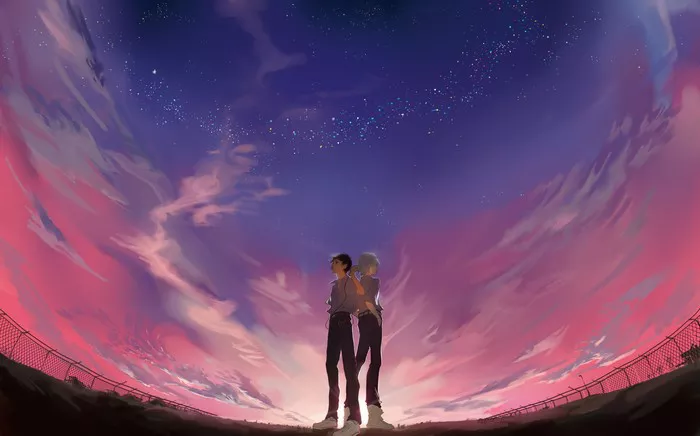Neon Genesis Evangelion” (commonly referred to as “Evangelion”) stands as one of the most revered and influential anime series of all time. Created by Hideaki Anno, this iconic masterpiece has captivated audiences worldwide since its debut in 1995. Through its intricate plot, complex characters, and profound themes, “Evangelion” offers a thought-provoking exploration of the human condition, leaving a lasting impact on viewers long after the credits roll.
The Power of Storytelling: Crafting a Multilayered Narrative
At its core, “Neon Genesis Evangelion” tells the story of a post-apocalyptic world ravaged by mysterious beings known as Angels, and the efforts of the paramilitary organization NERV to combat this existential threat using giant bio-mechanical constructs called Evangelions. However, beneath its surface, the series delves into a labyrinth of psychological, philosophical, and existential themes, weaving a narrative tapestry that challenges viewers to contemplate the nature of existence, identity, and purpose.
Character Development: A Journey of Self-Discovery
One of the most compelling aspects of “Evangelion” is its richly developed cast of characters, each grappling with their own inner demons and existential struggles. Protagonist Shinji Ikari, in particular, undergoes a profound journey of self-discovery as he navigates the complexities of piloting the Eva units and confronting his tumultuous relationship with his father, Gendo Ikari. Through Shinji’s experiences, viewers are invited to confront their own insecurities, fears, and desires, fostering a deeply personal and resonant connection with the narrative.
Themes and Symbolism: Unraveling the Layers of Meaning
“Neon Genesis Evangelion” is renowned for its rich symbolism and allegorical depth, inviting viewers to interpret its themes through multiple lenses. From religious iconography to Freudian psychoanalysis, the series draws upon a diverse array of cultural, philosophical, and psychological references to explore the complexities of the human psyche. Whether it’s the enigmatic nature of the Angels, the symbolism of the Eva units, or the existential dilemmas faced by its characters, “Evangelion” invites viewers to engage in a thought-provoking journey of interpretation and introspection.
Animation and Visual Style: Pushing the Boundaries of Creativity
In addition to its compelling narrative and thematic depth, “Neon Genesis Evangelion” is lauded for its groundbreaking animation and visual style. Directed by Hideaki Anno and produced by the renowned animation studio Gainax, the series boasts fluid animation, dynamic action sequences, and striking visual imagery that push the boundaries of creativity and innovation in the medium of anime. From the awe-inspiring battles between Eva units and Angels to the surreal dream sequences and introspective moments, the animation of “Evangelion” serves as a visual feast for the eyes, captivating viewers with its beauty and intricacy.
Cultural Impact: Shaping the Landscape of Anime
Since its release, “Neon Genesis Evangelion” has left an indelible mark on the landscape of anime and popular culture as a whole. Its influence can be seen in the countless anime series, films, and multimedia projects that have drawn inspiration from its themes, characters, and storytelling techniques. Moreover, “Evangelion” has garnered a dedicated global fanbase, with fans passionately discussing its themes, analyzing its symbolism, and engaging in spirited debates over its philosophical implications. Its impact extends far beyond the realm of anime, cementing its status as a cultural phenomenon that continues to resonate with audiences worldwide.
Conclusion: A Testament to Artistic Excellence
In conclusion, “Neon Genesis Evangelion” stands as a testament to the power of storytelling, animation, and artistic expression. Through its multilayered narrative, complex characters, and profound themes, the series transcends the confines of its medium to offer a deeply resonant exploration of the human condition. Whether viewed as a mecha anime, a psychological drama, or a philosophical treatise, “Evangelion” continues to captivate and inspire audiences with its enduring relevance and timeless brilliance. As we reflect on its legacy, we are reminded of the transformative power of art to provoke thought, evoke emotion, and transcend the boundaries of imagination.
In the words of Hideaki Anno, the creator of “Neon Genesis Evangelion,” “Evangelion is like a puzzle, you know. Any person can see it and give his/her own answer. In other words, we’re offering viewers to think by themselves, so that each person can imagine his/her own world. We will never offer the answers, even in the theatrical version. As for many Evangelion viewers, they may expect us to provide the ‘all-about Eva’ manuals, but there is no such thing. Don’t expect to get answers by someone. Don’t expect to be catered to all the time. We all have to find our own answers.”
In essence, “Neon Genesis Evangelion” invites us to embark on a journey of introspection, interpretation, and self-discovery, challenging us to confront the complexities of existence and embrace the beauty of the human experience.


